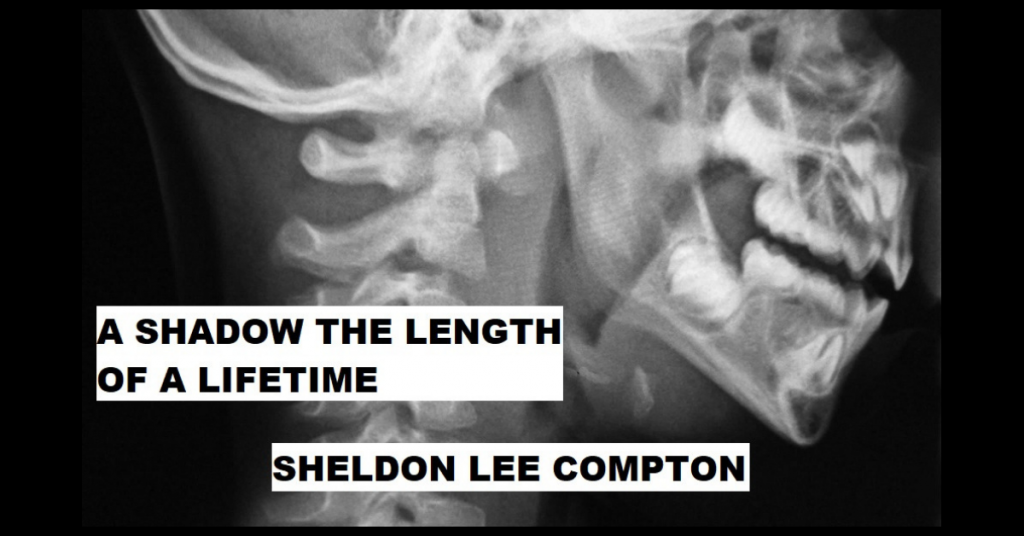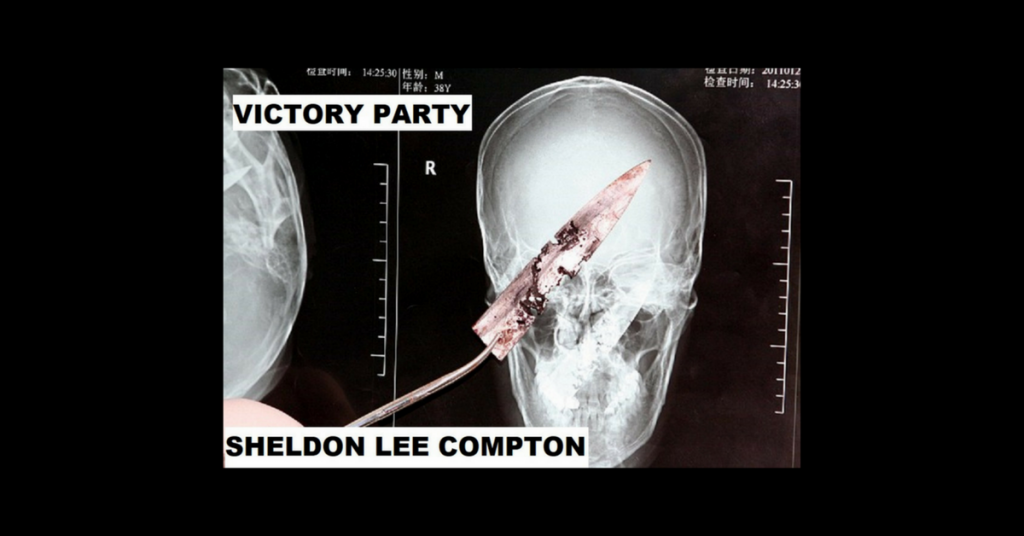
A SHADOW THE LENGTH OF A LIFETIME by Sheldon Lee Compton
The last address was easy to remember. But in a year living on the outskirts of downtown Portsville, Calup still confused First Street with Second Street about every other time. Maybe that’s what happened with his last letter. Confusion was now his general state of mind, even on good days, when it was only mild. At eighty-six years old, there were more days when he could remember what was in his lunch box the day the Number 2 tipple burned on Shelby Creek than he remember what street he lived on.
The post office lady pulled to his mailbox. He got up from porch swing and started toward her. She cradled a large pink box in her arms. Written on the side were flowery words reading Thirty-One. Not for him, no sir. Before Calup could make it to the edge of his yard, the lady shook her head and hunched her shoulders, hopped in her truck and sped off.
When he sent the contents of the storage chest to his daughter in Indiana he used a large media package. Calup half expected Cayaha to send it back. But now that it seemed she might be taking a notion to keep what he sent, he was seriously regretting sending the love letters he had written Susan, tucked away all these years at the bottom of the chest.
There wasn’t much in the chest, not like you’d expect from a package sent to a daughter from a father who was barely there most of the time. One would expect a whole spread of things trying to make up for lost time. But Calup knew that wasn’t possible. And there was nothing of any real value in the chest. All the same, three weeks and no response. He had to have mixed up First and Second again. It was the only thing that made sense. It happened the last time he sent Cayaha a card for her wedding anniversary. She told him so when he finally got her on the phone a couple months later.
When Cayaha was still in grade school they sent her to stay for a month with Susan’s brother up in Indiana. Susan said it would do her good to visit family and get her nose out of books, play like a normal girl, quit worrying about skinning her knees and get a little dirty.
Susan’s brother, Paul, drove cross-country delivering RVs, hauling his Chevy Rabbit along and driving it back from every state you could think of and some you couldn’t. Calup’s reservations had a lot to do with the fact that he never cared much for Paul from the start. Paul drank, played cards with drunks, fought with his wife, Nora, night and day. Paul and Nora had three daughters. Striped snakes were more kind, easier to get along with on account of the fact that their parents mostly left them alone. Kids left alone and bored are going to find the time to head in bad directions.
Paul’s three girls – Melanie, Sara and Brit – were all older than Cayaha and pure hell on wheels. This added to his worries, which he kept to himself and, instead, thought about all the possibilities after Susan slept easily two feet away from him. Those sleepless hours were tough, watching shadows of branches cast from the moonglow appear and disappear along the walls of the bedroom. In those black forms he saw Cayaha being bullied, shunned, yelled at, ignored, lonely with no books, no solitude. For others, maybe not a big problem. For his Cayaha, it was a straitjacket, no sunlight, no hope. During those hours alone with his thoughts beating away at him, Susan snored. Calup could not imagine what she dreamed of because she smiled between breaths, and it didn’t seem there was anything to smile about then.
What he couldn’t know was that the reality of Cayaha’s circumstances in Indiana was about as bad as he thought it was, but with a stranger set of characters. For the entire month she stayed with Susan’s family they were visited nights by a crew of people headed by Rocky and Kelly, a couple who had stayed drunk, to the best of Calup’s recollection, the entire twenty-five years they had lived together. The two of them moved north with Paul when coal busted for a while and factories elsewhere was the best option for work. Of course they had no intention of working, whether they were in Kentucky or Indiana or anywhere else for that matter. Rocky and Kelly’s only intentions were to party, their own unique blend made up of poker games, loud music, and drinking. Lots and lots of drinking, along with the occasional joint, if it was available.
Had Calup been there (and how he had wished a thousand times over that he had went with her) he would have been able to negotiate the kind of swarm that happened within a household when people like that got together, negotiate it for Cayaha, rustling her from one room to another if arguments started or drinking got out of hand. But he wasn’t. Nothing about that was ever going to change.
Turned out Susan thought the trip would toughen Cayaha up. Instead she came back saying she woke each morning and watched deer scatter across the yard and sprint toward the pond at the back of the house. She cried the way an adult would cry, no expression, just tears dropping every few seconds from the corners of her eyes, telling how one morning a big dog, a German Shepherd, she thought, chased a deer down and killed it at the property line in front of the house. She remembered how the steam lifted off its torn belly and floated away like smoke.
The trip was a failure on all levels, and the weeks and months and years that followed were picked apart by family, by counselors, by psychiatrists until Cayaha was a husk left by crows, empty and slowly dying. Still empty, still dying, but he was through thinking about it just now. It had cooled considerably after sunset and the Braves would be playing since they were off Monday. Baseball, beer, and a cool breeze could wipe a day clean better than about anything else.
He situated the radio on the porch rail. With Pete Van Wieren calling the count, Calup could almost forget. Some nights he prayed out loud to come down with Old Timer’s disease. Forgetting would be a way to stop one hour from becoming the next hour. These days it seemed getting from afternoon to evening and from evening to the next morning was the longest walk he’d ever taken. And he was tired, and he needed rest, and he needed Brian McCann to knock at least a sac fly and get Chipper in from second. It would be nice to take a series from the Mets at Citi Field. Calup tipped his beer and took a long swallow. This was the kind of evening that could almost clean him in a spiritual way, lift his guilt and regret for a brief time. Susan never understood why he carried, as she called it, his suitcase full of bricks, and now, six deep on Wildcat Cemetery, she never would. She took everything in stride. Parents make mistakes, she would say. Children are stronger than we give them credit for. Not everything bad that happens to this family is your fault. It was nice to know she almost certainly died at peace, probably telling herself that nobody was perfect and you’d be surprised who could get into heaven these days.
Calup woke early as usual the next morning and went to the porch with his coffee. Post lady would be here in an hour or so. He watched the sun coming up and searched for whatever sort of inspiration or glory people seemed to find there, but all he ever saw was that color of bright washed pink, like a nosebleed from a cloud. That sort of bitterness that stole even a beautiful morning ate at him most days now. It was a new feeling, and one he didn’t welcome. Keep moving along, bitterness. We’re all full up here.
He sipped his coffee, already cooled from the milk he added, and fought off those old bedtime thoughts, fought at them until he heard the rumble of the post lady. He watched her place a stuffed manila envelope in his box, struggle to close the latch, and then finally leave it hanging. She waved and he waved back. When she marched to the truck, she stopped and slapped her thigh, bent and grabbed a package, his package. Turning, she held it up and smiled at him. Calup didn’t move from the swing. He motioned for her to sit it down outside the fence, and she did. The sun was bleeding yellow now, the color of ripe corn.
It didn’t matter what was in the envelope; it didn’t matter the package was the same size as the chest he sent to Cahaya. All a man could do was everything he could, and the fact that he hadn’t done this enough in his life was its own trip to Indiana. It was grief on top of grief on top of grief. But time won’t stop so a person can catch their breath. Time falls across the world the same way it always has, with a hatred for living creatures unable to lean into that forward motion. Calup held his wristwatch to his ear and counted off ten, twenty, thirty seconds. The sun had stopped at the edge of the sky. Who knew when it would move again.

